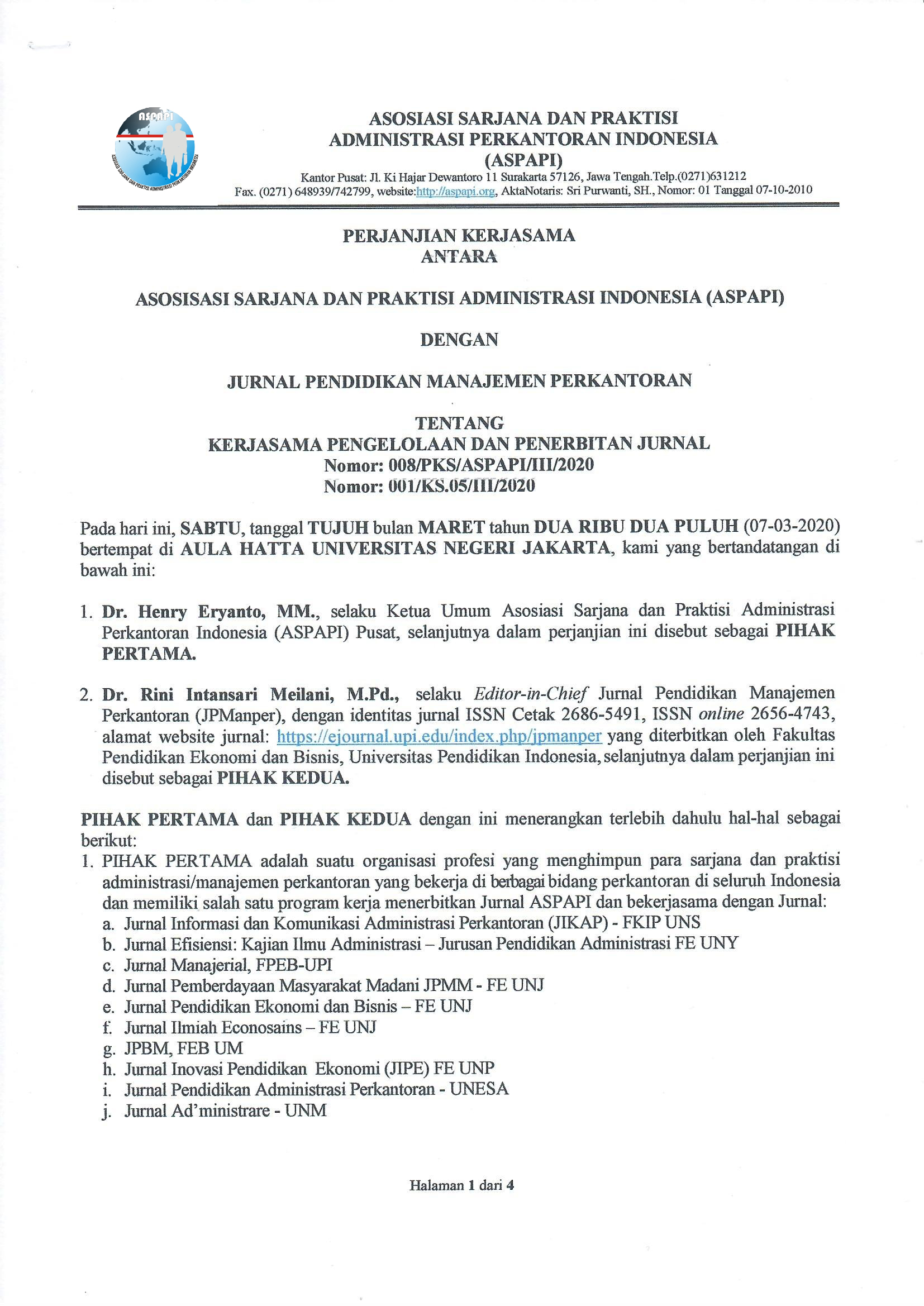ANALISIS PENGARUH KOMPETENSI KEPRIBADIAN GURU DENGAN MOTIVASI BELAJAR SEBAGAI VARIABEL INTERVENING TERHADAP PRESTASI BELAJAR SISWA KELAS X ADMINISTRASI PERKANTORAN
Abstract
Penelitin ini bertujuan untuk menganlisis apakah kompetensi kepribadian guru berpengaruh positif dan signifikan terhadap prestasi belajar siswa melalui motivasi belajar siswa secara langsung maupun tidak langsung kelas X pada mata pelajaran produktif Administrasi Perkantoran SMK di Kota Cimahi. Penelitian menggunakan metode survey dengan teknik penyebaran angket kepada 94 responden dan teknik analisis data menggunakan analisis regresi sederhana. Hasil penelitian menunjukkan bahwa kompetensi kepribadian guru berpengaruh positif dan signifikan terhadap motivasi belajar siswa, sehingga dapat disimpulkan bahwa semakin tinggi kompetensi kepribadian guru maka semakin tinggi pula motivasi belajar siswa. Motivasi belajar siswa berpengaruh positif terhadap prestasi belajar siswa, sehingga dapat disimpulkan semakin tinggi motivasi belajar siswa maka semakin tinggi pula prestasi belajar siswa. Kompetensi kepribadian guru berpengaruh positif dan signifikan secara langsung maupun tidak langsung terhadap prestasi belajar siswa melalui motivasi belajar siswa, sehingga dapat disimpulkan semakin tinggi kompetensi kepribadian guru melalui motivasi belajar siswa maka semakin tinggi prestasi belajar siswa.
Kata Kunci: kompetensi kepribadian guru, motivasi belajar, prestasi belajar
AN ANALYSIS OF THE INFLUENCE OF PERSONAL COMPETENCE OF TEACHERS WITH MOTIVATION TO LEARN AS AN INTERVENING VARIABLE ON ACHIEVEMENT OF ADMINISTRATIVE OFFICE STUDENT GRADE X
This study aimed to analyze the influence of teacher’s personality competence has positive and significant impact toward student achievement through students’ learning motivation directly or indirectly on the subject of class X of Office Administration productive SMK in Cimahi. The research method used survey methods by distributing questionnaires to 94 students as respondents in grade X of Office Administration and data analyzed by simple regression analysis. The results showed that the of the teacher's personality competence has positive and significant impact on student motivation, so it can be concluded that the higher of the teacher's personality competence, the higher the students' learning motivation. Students’ learning motivation has positive effect on student achievement, so it can be concluded the higher the students' learning motivation, the higher the student achievement. The teacher's personality competence has positive and significant impact on student achievement through students’ learning motivation, so it can be concluded the higher the of the teacher's personality competence through the students' learning motivation, the higher of student achievement.
Keywords: teacher's personality competence, learning motivation, academic achievement
Full Text:
PDFReferences
Aliakbari, M. (2013). On The Relationship between Efficacy of Classroom Management,Transformational Leadership Style, and Teachers’ Personality. Social and Behavioral Sciences , 1716-1721.
Barak, M. (2016). Motivation to learn in massive open online courses: Examining aspects of language and social engagement. Computers & Education 94 , 46-60.
Blašková, M. (2014). Competences and Competence Model of University Teachers. Social and Behavioral Sciences 159 ( 2014 ) 457 – 467 , 457-467.
Blaskova, M. (2015). Development of Key Competences of University Teachers and Managers. Social and Behavioral Sciences , 187-196.
Blaskova, M. (2015). Development of Key Competences of University Teachers and Managers. Social and Behavioral Sciences 182 , 187-196.
Blašková, M. (2014). Key personality competences of university teacher: comparison of requirements defined by teachers and/versus defined by students. Social and Behavioral Sciences 114 , 466-475.
CHU, J. H. (2015). The Impact of Teacher Credentials on Student Achievment in China. China Economic Review 36 , 14-24.
Djigić, G. (2014). Basic personality dimensions and teachers’ self-efficacy. Social and Behavioral Sciences 112 , 593-602.
Hamdu, G., & Agustina, L. (2011). Pengaruh Motivasi Belajar SiswanTerhadap Prestasi Belajar IPA di Sekolah Dasar (Studi Kasus terhadap Siswa Kelas IV SDN Tarumanegara Kecamatan Tawang Kota Tasikmalaya). Jurnal Penelitian Pendidikan , 12.
Hamjah, S. H. (2011). Methods of Increasing Learning Motivation among Students. Social and Behavioral Sciences 18 , 138-147.
Ici, A. (2014). The relationship between authoritarian personality and liking of children levels of teacher candidates. Social and Behavioral Sciences , 3203-3207.
Koca, N. (2015). The Impact of Number of Students per Teacher on Student Achievement. Social andBehaviroal Sciences 177 , 65-70.
Lavasani, M. G. (2011). The role of achievement goals, academic motivation, and learning strategies in statistics anxiety: testing a causal model. Social and Behavioral Sciences 15 , 1881-1886.
Magelinskaitė, Š. (2014). Relationship between social competence, learning motivation, and school anxiety in primary school. Social and Behavioral Sciences 116 , 2936-2940.
Nam, C. W. (2014). The effect Of Trust and Contructive Controvesy on Student Achievement and Attitude in Online Cooperative Learning Environments. Computers in Human Behavior 37 , 237-248.
Ngalim Purwanto. (2006). Psikologi Pendidikan. Bandung: PT. Rmaja Rosdakarya.
Rushton, S. (2007). Teacher’s Myers-Briggs personality profiles: Identifying effective teacher personality traits. Teaching and Teacher Education 23 , 432-441.
Sussana. (2014). Kepribadian Guru PAI dalam Tantangan Globalisasi. Jurnal Mudarrisuna , 4 (2).
Undang-undang No. 14 Tahun 2005 Tentang Guru dan Dosen
Vaessen, B. E. (2014). University Students Achievement Goals and Help-seeking Strategies In An Intelligent Tutoring System. Computers and Education 72 , 196-208.
Yusof, R. (2014). Consistency Of Personality Profiles With Teaching Career Environment At Specialist Teacher Education Institute Kuala Lumpur. Social and Behavioral Sciences , 141-147.
DOI: https://doi.org/10.17509/jpm.v1i1.3344
Refbacks
- There are currently no refbacks.
Copyright (c) 2016 Jurnal Pendidikan Manajemen Perkantoran
Jurnal Pendidikan Manajemen Perkantoran View My Stats



